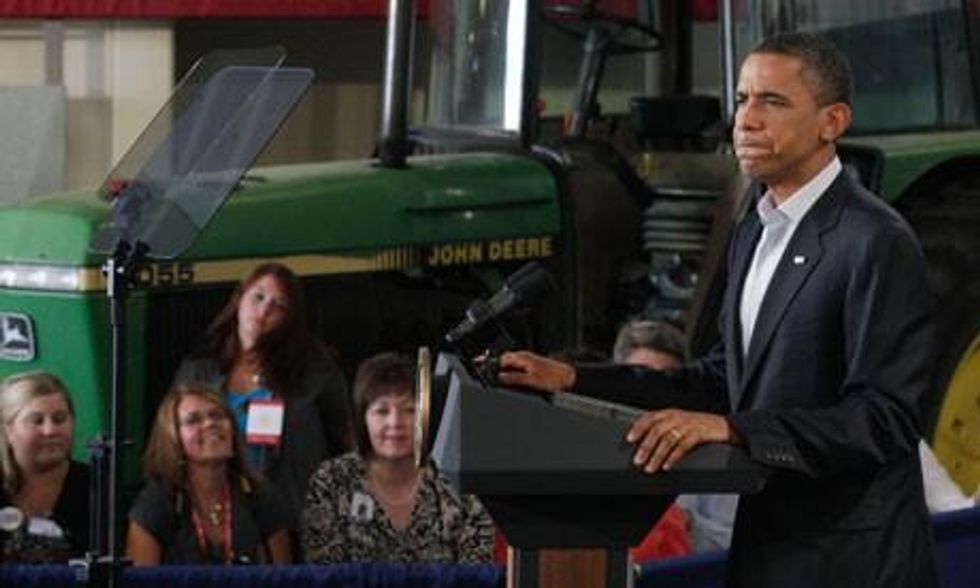It is bad enough that President Obama is reversing his campaign pledge and supporting Bush-era trade deals with Korea, Colombia and Panama. Starting this week in Chicago, the US will be hosting the first major trade negotiations since the "Battle in Seattle" World Trade Organisation talks came here in 1999. This occasion is for the Trans-Pacific Partnership (TPP) with a wide range of industrialised and developing Pacific Rim countries.
As part of his plan to revive the US economy and create jobs, Obama claims he will be unveiling "a trade agreement for the 21st century". Ironically, though, he will be pushing the same "Nafta-style" trade pacts he campaigned against, and to howls of protest from his own electoral base. Let us not forget what he said:
"I voted against Cafta, never supported Nafta, and will not support Nafta-style trade agreements in the future," Obama told Ohio voters (pdf) in 2008. "While Nafta gave broad rights to investors, it paid only lip service to the rights of labor and the importance of environmental protection."
"Lip service" would be a good way to describe the reforms in US trade policy under Obama. As co-chairs of a three-country task force to reform Nafta, we can say that not only do the administration's TPP proposals fail to reform most of Nafta's worst provisions, they actually take several steps backward.
From an economic perspective, the TPP would be the largest US trade agreement since Nafta, since it involves not only developing countries (Peru, Vietnam, Malaysia, Brunei, Singapore), but also four OECD countries (Chile, the United States, Australia and New Zealand). But while some argue that this makes the TPP "the single most important US trade initiative", a UN study (pdf) points out that the economic impact of the TPP will be quite limited because most of the participants already have bilateral trade agreements with TPP counterparts.
"Lip service" would be a good way to describe the reforms in US trade policy under Obama. In 2007, congressional Democrats won some minor but important reforms to post-Nafta trade agreements, in the areas of labour enforcement, environmental protection and intellectual property rules. Obama hasn't even held onto these in current negotiations, giving up important language to allow easier access to generic medicines in the pending agreement with Korea. By all accounts, the administration won't put them in the TPP either. As one unnamed trade official told Inside US Trade, "2007 was 2007, 2011 is 2011."
US Secretary of State Hilary Clinton recently gave the TPP her own lip service in Hong Kong. There, she touted the TPP as setting "a new high standard for multilateral free trade", one that could achieve "sustainable, inclusive growth". Clinton alluded to the agreed 2007 protections on labour rights, the environment and intellectual property, then added that these "21st-century" US proposals actually are all about "regulatory coherence".
If that sounds to you like a sanitised term for deregulation, you're right. The "21st-century trade agreement" will not better balance the rights of multinational firms with the needs of the majority; rather, it will grant more rights to investors.
By all accounts, the US TPP negotiators continue to push for the controversial investor-state dispute provision, which allows multinationals to directly sue a foreign government for regulatory actions - rather than have such disputes be conducted by governments, as is the case at the WTO. The US-Australia free trade agreement does not include the investor-state investment provision, and the Australian government has indicated strongly that it will not consider such a provision for the TPP. No matter. What did Obama say in 2008 about no longer "giving broad rights to investors"?
Then, with the power to sue other governments that try to regulate in hand, the US proposals would force trading partners to open their financial services sectors to the very companies that brought us the recent financial crisis. Such provisions fly in the face of recommendations on investment from a group of over 250 US and globally renowned economists, recommendations that merely echoed those from some of the members of President Obama's own state department panel named to review the US language.
At this point, US proposals for the TPP hardly break from the Nafta mold, and many weaken or eliminate the few important advances we've seen since Nafta in US trade proposals. Like Nafta, current US proposals fail to account for asymmetries among trading partners and restrict the ability of the US and its trading partners to provide the regulations that their democracies want to enable financial stability, economic growth and jobs.
